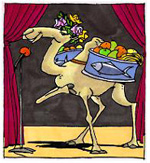Jean
Cocteau, French poet, playwright, and general gadabout, once proclaimed
that the first poet to compare the lips of his beloved to a rose was
a genius; the second, he said was an idiot. In Jewish culture, being
the first is also important; but being best is even better.
A whole range of Hebrew vocabulary items has grown out of  (bet, khaf, resh), the Hebrew root for seniority. When Esau,
Isaac's first born, sells his
(bet, khaf, resh), the Hebrew root for seniority. When Esau,
Isaac's first born, sells his  (bekhora), birthright, to Jacob for a "mess of pottage," he comes
in for a great deal of historical scorn. And yet, although Scripture
assigns a crucial role to the laws of primogeniture, Reuben, Jacob's
(bekhora), birthright, to Jacob for a "mess of pottage," he comes
in for a great deal of historical scorn. And yet, although Scripture
assigns a crucial role to the laws of primogeniture, Reuben, Jacob's
 (bekhor), first born, is overshadowed by Jacob's two activist
sons, Judah and Joseph, who become the leaders of the Tribe.
(bekhor), first born, is overshadowed by Jacob's two activist
sons, Judah and Joseph, who become the leaders of the Tribe.
It is fascinating to observe how smoothly Hebrew words move from one
semantic field to another: the verb  (bikker) comes to mean, not only "he recognized as first born,"
but also "he chose," "he preferred." God's term of endearment for His
people is
(bikker) comes to mean, not only "he recognized as first born,"
but also "he chose," "he preferred." God's term of endearment for His
people is  (beni bekhori yisrael), best translated as "my preferred son,
Israel."
(beni bekhori yisrael), best translated as "my preferred son,
Israel."
Our root also finds its way into the Jewish laws of agriculture. The
holiday of Shavu'ot, Pentecost, is also known as  (hag ha-bikkurim), the Feast of the First Fruits. The first rain
of the season is called the
(hag ha-bikkurim), the Feast of the First Fruits. The first rain
of the season is called the  (bakira). There is even a verb for when a female animal gives
birth for the first time; it is said that she
(bakira). There is even a verb for when a female animal gives
birth for the first time; it is said that she  (hivkira).
(hivkira).
In modern times, the root is found in the theater, at the university
and in cans of tuna fish. The first staging of a play is called a  (hatsagat bekhora), premiere, and, in a sense, so might this
issue of Jewish Heritage Online Magazine. Probably the most coveted
rank of a young academic in Israel is
(hatsagat bekhora), premiere, and, in a sense, so might this
issue of Jewish Heritage Online Magazine. Probably the most coveted
rank of a young academic in Israel is  (martseh bakhir), Senior Lecturer, because with that title comes
a place on the tenure track.
(martseh bakhir), Senior Lecturer, because with that title comes
a place on the tenure track.
And then there is the case of Albacore tuna. Believe it or not, this
word comes from the Arabic form of our root, al-bakrah, whose
cognate in Hebrew is  (bekher), a young camel. Although one would willingly concede
that Albacore tuna is like a "prime" cut of meat, and therefore might
indeed come from our root, only a poet, perhaps, would want to try to
create a metaphor comparing a tuna fish to a camel, however young.
(bekher), a young camel. Although one would willingly concede
that Albacore tuna is like a "prime" cut of meat, and therefore might
indeed come from our root, only a poet, perhaps, would want to try to
create a metaphor comparing a tuna fish to a camel, however young.
You go first.